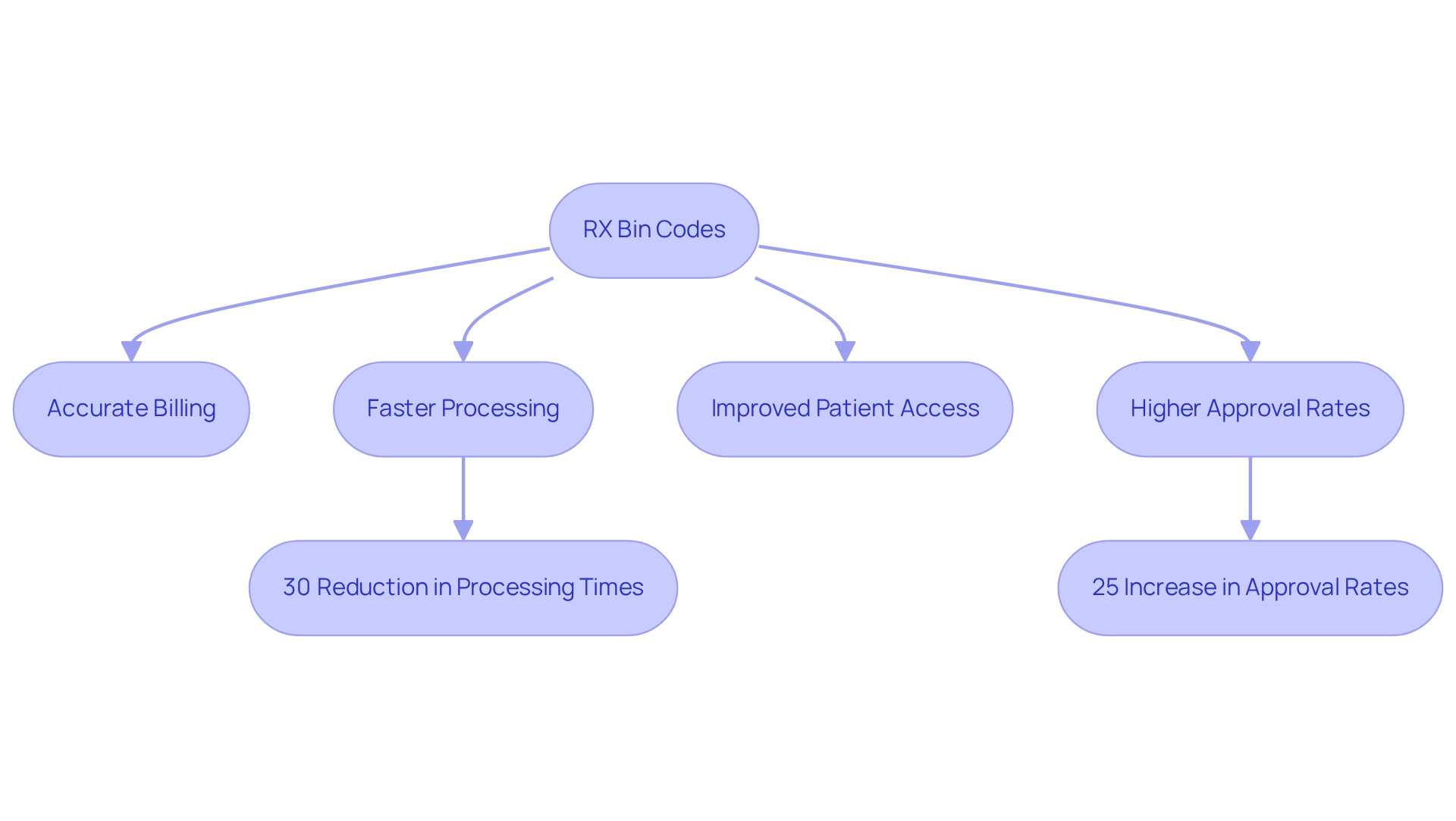Overview
This article elucidates the essential steps for navigating healthcare access through a comprehensive understanding and effective utilization of RX Bin numbers. These codes are critical for ensuring efficient pharmacy billing and claims processing. Notably, accurate RX Bin codes lead to a significant reduction in processing times and an enhancement in patient access to medications.
Statistics reveal a remarkable:
- 30% decrease in processing times
- 25% increase in approval rates for pharmacies that verify these codes prior to submissions.
Such data underscores the imperative nature of these codes in optimizing healthcare delivery.
Introduction
In the intricate world of healthcare, RX Bin numbers serve as vital navigational tools that streamline the pharmacy claims process. These six-digit codes are not merely administrative details; they play a crucial role in ensuring that patients receive timely access to their medications. As the healthcare landscape continues to evolve, understanding the significance of RX Bin numbers becomes essential for both healthcare providers and patients alike. Their impact is profound, reducing claim processing times and enhancing overall efficiency in pharmacy operations, which directly influences patient outcomes.
Exploring their placement on insurance cards, the implications for pharmaceutical market access, and the importance of accuracy reveals a complex yet essential system that underpins effective healthcare delivery.
Define RX Bin Numbers and Their Role in Healthcare
The six-digit sequences known as RX Bin codes, or Bank Identification Codes, are utilized by health plans to optimize the processing of electronic pharmacy submissions. These codes play a crucial role in directing requests to the appropriate insurance provider, enabling pharmacies to effectively invoice for medications. The accuracy of the rx bin code significantly affects the speed and efficiency of prescription fulfillment; incorrect rx bin codes can cause substantial delays in processing, ultimately impacting patient access to essential medications.
The importance of rx bin codes extends beyond mere billing, as they are integral to the overall efficiency of pharmacy operations. A recent analysis revealed that claims processed with accurate RX Bin codes experience a 30% reduction in processing times compared to those without them. This level of efficiency is vital in a healthcare environment where timely access to medications can profoundly affect health outcomes.
Healthcare professionals emphasize that understanding rx bin is essential for both providers and patients. As one expert noted, “If you work for a large corporation, the group identifier on your insurance card assists the hospital’s billing department in determining the precise terms of coverage your employer has negotiated with the insurance company.” Similarly, the rx bin code ensures that patients receive their medications without unnecessary delays, which can be critical for individuals with chronic conditions.
Moreover, case studies underscore the significance of rx bin in streamlining healthcare processing. For instance, a recent study highlighted how a pharmacy that implemented a system for verifying RX Bin identifiers prior to submission saw a 25% increase in approval rates on the initial submission. This not only enhanced cash flow for the pharmacy but also boosted client satisfaction by reducing wait times for medication. Additionally, it is crucial for pharmacies to regularly verify insurance cards for errors or outdated information, as these can directly affect the accuracy of the rx bin and the overall reimbursement process.
In conclusion, rx bin identifiers are not merely administrative codes; instead, they are essential tools that facilitate efficient pharmacy billing and claims processing, ultimately enhancing patient access to necessary medications and improving overall healthcare delivery.

Locate RX Bin Numbers on Your Insurance Card
To locate your rx bin code, thoroughly examine your health insurance card. Typically marked as ‘rx bin,’ this identifier is often found in the lower left corner alongside other identifiers such as the member ID and processor control number (PCN). If it’s not visible there, check the front of the card where pharmacy benefits are usually detailed. In some instances, the RX Bin may also be included in the documentation provided by your insurance provider. If you still cannot find it, contacting your insurance provider directly can clarify any uncertainties regarding your rx bin.
Regular verification of your insurance card information is essential; approximately 20% of submissions are rejected due to errors with the rx bin. This statistic underscores the necessity of maintaining precise details for seamless healthcare access.
As Ashish Patel notes, ‘CareSet interprets Medicare data, improving healthcare insights to raise standards of care for individuals and communities.’ This statement emphasizes the critical role that accurate rx bin information plays in the broader healthcare landscape.
Furthermore, the case study on routine checks of insurance card information illustrates that maintaining accurate data helps prevent complications in accessing healthcare services and ensures proper billing. It is also important to understand the PCN, especially when dealing with out-of-network services or mail-order pharmacies.
Understand the Impact of RX Bin Numbers on Pharmaceutical Market Access
The role of rx bin codes is pivotal in pharmaceutical market access, significantly influencing the processing and reimbursement of requests. Precise rx bin codes are essential for pharmacies to bill the correct insurance provider, ensuring timely access to medications for individuals.
For pharmaceutical companies, a comprehensive understanding of the RX Bin landscape, including relevant NDC and HCPCS codes, is vital for crafting effective strategies for product launches and market penetration. Statistics indicate that processing errors associated with rx bin codes can lead to considerable delays in medication accessibility, resulting in increased out-of-pocket expenses for individuals and diminished adherence to prescribed treatments.
As highlighted by Chiquita Brooks-LaSure, Administrator of the Centers for Medicare & Medicaid Services, “This final rule imposes mandates that will result in anticipated costs to State, local, and Tribal governments or the private sector, but the transfer costs will be less than the threshold.” Therefore, stakeholders must prioritize the accuracy of rx bin information to bolster their market access initiatives.
Mismanagement or errors in the rx bin codes disrupt the supply chain and have broader implications for healthcare and pharmaceutical revenue. Furthermore, with CareSet’s extensive Medicare data insights, stakeholders can analyze patient treatment pathways and grasp the intricacies of Medicare claims data, empowering them to make informed decisions.
CareSet’s data solutions specifically address the complexities surrounding rx bin identifiers by offering insights into the associated NDC and HCPCS codes, enabling companies to refine their market access strategies. CMS is contemplating a dispute resolution process for manufacturers who contest misclassification corrections, underscoring the regulatory complexities surrounding rx bin numbers.
By leveraging accurate RX Bin information alongside CareSet’s data solutions, companies can enhance patient outcomes and ensure compliance with reimbursement protocols using the RX Bin.
Conclusion
RX Bin numbers are indispensable in the healthcare system, playing a pivotal role in the efficient processing of pharmacy claims. These six-digit codes direct claims to the appropriate insurance providers, thereby reducing processing times and enhancing patient access to essential medications. This efficiency is particularly crucial for patients with chronic conditions who depend on timely medication fulfillment.
Identifying the RX Bin number on insurance cards is vital for both patients and healthcare providers. Regular verification of this information can avert claim denials and guarantee seamless access to medications. A thorough understanding of the location and significance of this number can markedly improve the pharmacy claims process.
Moreover, RX Bin numbers significantly influence pharmaceutical market access by impacting billing accuracy and reimbursement strategies. Mistakes in these codes can result in delays in medication availability and increased costs for patients, ultimately affecting adherence to prescribed therapies. As the healthcare landscape evolves, prioritizing the accuracy of RX Bin numbers becomes essential for maintaining operational efficiency and ensuring optimal patient care.
In conclusion, RX Bin numbers are crucial tools for effective healthcare delivery. By recognizing their importance and ensuring precise information, stakeholders can enhance pharmacy operations, improve patient outcomes, and contribute to a more effective healthcare system.


